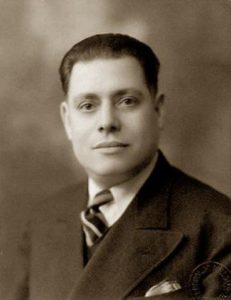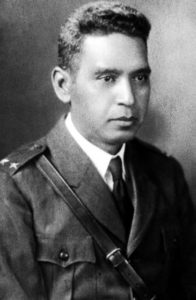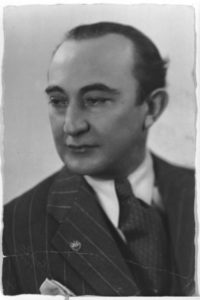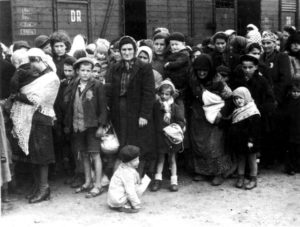Jose Arturo Castellanos Contreras was born in San Vicente, San Salvador in December of 1893 to the well-to-do family of General Adelino Castellanos and Isabel Contreras de Castellanos.
When he was of age, his father sent him to the prestigious Military Polytechnic School. He spent the next 26 years in the Salvadoran Army, rising to the rank of colonel.
After becoming the Second Chief of the General Staff of The Army of the Republic he had a life–altering change of career. He had opposed the Salvadoran President Maximillano Hernandez Martinez, a dictator who had seized power in a coup in 1931. He proceeded to run a fascist regime and executed thousands of dissidents.
Given Contreras’s position in the Army and family connections, Martinez decided it would be better to banish him from San Salvador rather than kill him. A less than subtle suggestion to Contreras convinced him to accept the post of Salvadoran Consul General in Liverpool, England in 1937. A year later, he was transferred to Hamburg, Germany.
Contreras wasn’t happy being relocated to another fascist country. He was dismayed and angry at the way minorities were being treated. But he was unable to do much about it. Making waves could cause trouble for his family back home.
Then, on November 9th, 1938, things changed profoundly for the colonel. Over the next two days, Fascist thugs attacked Jewish businesses, synagogues and buildings all over Germany, burning and looting in what was to be known as Kristallnacht, The Night of Broken Glass (because the windows on many Jewish businesses were smashed).
By the time the nightmare was over on the 10th, over 1000 synagogues had been burned and more than 7000 Jewish businesses had been destroyed. Many Jews were beaten or killed. Some 30000 Jewish men were arrested and thrown into concentration camps.
It was the beginning of The Final Solution – the eradication of the Jews in Europe.
Contreras was horrified and disgusted. He fired off a letter to El Salvador’s Foreign Minister, Miguel Angel Araujo describing what had happened and requested permission to give visas to anyone who wanted to leave Germany.
Permission was not granted. El Salvador had plenty of its own problems and the last thing the country needed was to rock the boat with the much more powerful Germany. El Salvador wasn’t the only one closing the door. The U.S. and Britain turned away many refugees.
Their feeling was they were slowly recovering from a Great Depression, unemployment was high and a wave of unemployed, non-English speaking people would only make economic matters worse.
Contreras’s troublesome reputation had preceded him. He was reassigned to Geneva, Switzerland in 1941.
Enter Gyorgy Mandl. He was a Jew born in Transylvania. He thought he would be safe from persecution in Romania, since it had been neutral since WWI.
He was wrong.
The country’s National Legionary State had taken power in September 1940 and they were virulently anti-Semitic. They sided with Germany in the war and in October some 500000 German troops goose-stepped into Romania.
The Final Solution had arrived. That country’s pogrom began in January.
Mandl fled to Switzerland with his family where he met Contreras. Despite being officially neutral, Switzerland had a border with Germany and, concerned about maintaining their neutrality, had strict refugee laws. They were wary of upsetting their infinitely more powerful neighbor.
Concerned his new friend might be deported, Contreras made Mandl a Salvadoran citizen and changed his name on his passport to “Mantello.” Completely illegal, but no one became aware of it. It saved the Mandl family from deportation.
Contreras tried again to appeal to the Salvadoran Ministry and again the request was refused.
Enter Carl Lutz. He was the Swiss vice-consul in Budapest, Hungary. He had been giving out Swiss “Safe-Conduct” papers to Jews and found safe houses for them.
Germany’s Teutonic bureaucracy believed the papers were genuine. The Swiss government didn’t know about them.
Officially.
In 1942, Contreras solemnly made Mandl/Mantello “First Secretary of the El Salvadoran Swiss Consul,” a position that didn’t exist. The new First Secretary began issuing Salvadoran citizenship papers to Jews all over Eastern Europe. For the ones that couldn’t make it to Switzerland, he mailed them. In short order, 13000 Czech, Hungarian, Polish and Romanian Jewish families became Salvadorans.
The documents granted holders the protection of the International Red Cross and the Swiss Consul in Budapest. When Germany invaded Budapest in1944, blank sheets of paper were sent out to Jewish families with instructions to stick on their own pictures and fill out the information by hand.
In 1944, Martinez was overthrown and fled to Honduras via Guatemala. In May of 1966, his driver, whose father had been killed by the Martinez regime, stabbed him to death.
The new Salvadoran government was more sympathetic to Jews and asked Switzerland to recognize its citizens and extend diplomatic protection to them.
After the war, the Colonel lived a quiet life and rarely spoke to anyone about his rescue efforts. He died in May 1977.
In 2010, Yad Vashem, an Israeli organization dedicated to honoring any Jew that resisted the Holocaust and any Gentiles who helped Jews in need, recognized Colonel Castellanos with the title of “Righteous Among the Nations.”




